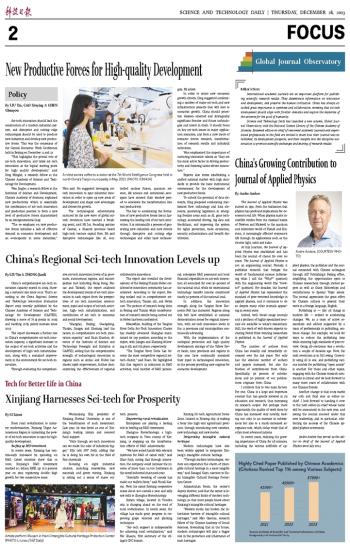
 |
| A robot serves coffee to a visitor at the 7th World Intelligence Congress held in north China's Tianjin municipality in May 2023. (PHOTO: XINHUA) |
Sci-tech innovation should lead the construction of a modern industrial system, and disruptive and cutting-edge technologies should be used to produce new industries and develop new productive forces. This was the consensus of the Central Economic Work Conference held in Beijing on December 11 and 12.
"This highlights the pivotal role of sci-tech innovation, and takes sci-tech innovation as the logical starting point for high-quality development," said Ding Minglei, a research fellow at the Chinese Academy of Science and Technology for Development.
Wan Jingbo, a research fellow at the Institutes of Science and Development, Chinese Academy of Sciences, explained new productivity, which is essentially the combination of sci-tech innovation and production practice to form a new level of productive forces characterized by an intergenerational leap.
"The re-emphasis on new productive forces indicates a lack of effective demand in economic development and an overcapacity in some industries," Wan said. He suggested leveraging sci-tech innovation to spur industrial innovation in order to open up new areas of development and shape new advantages and drivers for growth.
The technological achievements nurtured by the new wave of global sci-tech revolution have reached a breaking point, said Mi Lei, founding partner of Casstar, a Shaanxi province-based high-tech venture capital firm. Mi said disruptive technologies like AI, controlled nuclear fusion, quantum science, life science and commercial aerospace have entered their window period to accelerate the transformation into real productivity.
The key to accelerating the formation of new productive forces lies in harnessing the leading role of sci-tech innovation. It is intrinsically a process of generating new industries and new drivers through disruptive and cutting-edge technologies and other hard technologies, Mi added.
In order to create new economic growth drivers, Ding suggested accelerating a number of major sci-tech and new infrastructure projects that will lead to economic growth. China should prioritize mission-oriented and strategically significant frontier and future technologies and invest in them. It should focus on key sci-tech issues in major application scenarios, and form a new mode of scenario-driven research, transformation of research results and industrial cultivation.
Wan emphasized the importance of nurturing innovative talents as "they are the most active factor in driving productivity and fostering talent-driven innovation."
Experts also stress establishing a unified national market with high standards to provide the basic institutional environment for the development of new productive forces.
To unlock the potential of data elements, Ding proposed accelerating marketized flow technology and data elements, promoting legislation in emerging frontier areas such as AI, gene technology, automated driving, big data and blockchain, and improving the system for rights protection, trade circulation, security authentication and benefit distribution.


 Next
Next




